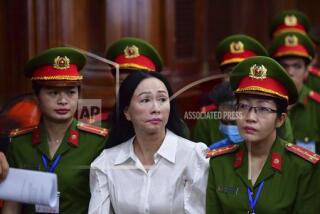Three Khmer Rouge leaders go on trial in Cambodia
- Share via
Reporting from New Delhi — Three top Khmer Rouge leaders accused of helping mastermind Cambodia’s “killing fields” in the 1970s went on trial in Phnom Penh on Monday as hundreds of victims and curious onlookers arrived at the court from around the country to witness the proceedings.
The U.N.-backed trial is expected to take months. Furthermore, there’s often been a significant delay in past tribunals between the end of testimony and the verdict.
This reflects in part the highly political nature of these proceedings in a nation where feelings about that brutal period of history are still raw and many of those who served in the Khmer Rouge remain prominent in society.
Adding to the pressure is the advanced age of many of the victims and accused, amid fears those who committed atrocities will die before they face justice.
The three defendants — Nuon Chea, 85, the Khmer Rouge’s chief ideologist and second in command; Khieu Samphan, 80, a former head of state; and Ieng Sary, 86, former foreign minister — sat in a row beside their lawyers Monday in a courtroom built for the tribunal.
The charges they face include crimes against humanity, genocide, religious persecution, homicide and torture.
A court ruled last week that a fourth defendant, Ieng Thirith, 79, would not face trial because she has Alzheimer’s disease, although prosecutors are appealing that ruling. She is the wife of Ieng Sary and a former minister for social affairs.
“We welcome the start of this trial and think it’s good for Cambodia,” said Rupert Abbott, a researcher with the human rights group Amnesty International. “It’s important, not just to bring justice to victims of the Khmer Rouge and that the court follows international standards. It’s also important to create a legacy, an example, for Cambodia justice and show what a fair trial looks like.”
The Khmer Rouge’s top leader and ideological inspiration, Pol Pot, died in 1998 in the jungle while being held prisoner by his comrades.
During the 1975-79 reign of the regime, featured in the 1984 film “The Killing Fields,” an estimated 1.7 million people starved to death, were executed or perished from exhaustion or lack of medical attention as a result of radical policies aimed at creating a completely agrarian socialist society.
In the prosecution’s opening statement, according to the Associated Press, co-prosecutor Chea Leang outlined the Khmer Rouge’s atrocities as its troops captured Phnom Penh, the capital, in April 1975 after a five-year civil war and started forcing the estimated 1 million city dwellers into rural areas.
Chea Leang also pledged to show that the regime, which was overseen by the three defendants, “was one of the most brutal and horrific in modern history.” She and other prosecutors are expected to seek life in prison, the maximum penalty, for the defendants.
This is the second of four cases by the tribunal, established in 2006. In the first case, Kang Kek Ieu, known as Kaing Guek Eav in tribunal filings, former head of the regime’s notorious S-21 prison, was convicted in July 2010 and sentenced to 35 years in prison. The charges against the prison warden, a much lower-level official than the three currently on trial, included war crimes, crimes against humanity and related offenses. The sentence was subsequently reduced to 19 years in part because of credit given for the time he had served.
The tribunal has been hit with allegations of political interference as critics say it has succumbed to pressure from the government to stop looking too closely at regime history.
The court in the current trial has divided the case into several mini-trials in light of the ages of the defendants, instead of considering all the complex charges in a single proceeding.
“Presumably one reason is the concern that the whole trial could take a long time,” Abbott said. “So they’re looking at one alleged crime at a time.”
On Monday, hundreds of people — including survivors, former regime cadres, monks in robes and students in school uniforms — packed the court’s public gallery for the beginning of four days of opening statements in the closely watched case.
More to Read
Sign up for Essential California
The most important California stories and recommendations in your inbox every morning.
You may occasionally receive promotional content from the Los Angeles Times.










